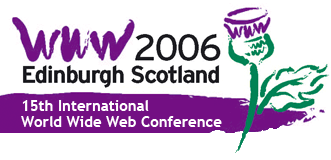
World Wide Web Conference calls on Government to improve its websitesOver half of all UK government and local authority websites have errors on their home pages and are problematic for disabled access, a survey in the run up to a major World Wide Web conference reveals. In advance of WWW2006, which will be held in Edinburgh in May, research carried out by academics at the University of Southampton has revealed that 60 per cent of UK Government websites contain HTML errors. A further 61 per cent do not fully comply with guidelines from the World Wide Web Consortium (Web Content Accessibility Guide - WCAG), which could prevent some individuals from being able to access them. WWW2006 has called on webmasters from UK local authority and central government to attend the conference in order to increase their understanding of the latest Web standards and encourage them to adopt them. According to Adam Field from the University of Southampton's School of Electronics and Computer Science (ECS) who conducted the survey, a website may look fine and be error-free but this does not mean that it will work with all browsers and for all users and may not always be accessible for visually impaired people. The aim is for websites to function with any browser and any size screen, which can happen if site developers follow the proper guidelines. The good news for the UK Government is that 25 per cent of all home pages are error-free and fully compliant with WCAG. 'There is a big push within Government to improve web accessibility,' commented Mr Field. 'Although 61 per cent of sites do not comply with WCAG, the 39 per cent which do is encouraging.' The conference, organized by the University of Southampton in association with the British Computer Society and other international organisations, will bring together key players from the international web community. Some of the events from which webmasters may benefit are:
Speakers at the conference, which is expected to attract up to 2,000 delegates, include key players from the world web technology and communications sectors including Sir Tim Berners Lee, director of the World Wide Web Consortium; David Brown, chairman of Motorola; Mike Harris, executive vice chairman and founder, Egg PLC; and Gillian Kent, director, MSN.co.uk. Ends Notes for editors:1. The survey included all government department and local authorities sites listed on the DirectGov directory website: (http://www.direct.gov.uk/Dl1/Directories/fs/en). To test the sites, each homepage was submitted to the W3C HTML validator: (http://validator.w3.org/) and the Hermish Accessibility Evaluator: (http://www.hermish.com/). 2. Further information about WWW2006 can be accessed at: www2006.org. This year's conference is coming to the UK for the first time ever, and is organized by the School of Electronics and Computer Science in association with the British Computer Society and the Association for Computing Machinery. It will be held in Edinburgh between 23 and 26 May 2006. 3. With around 480 researchers, and 900 undergraduate students, the School of Electronics and Computer Science at Southampton is one of the world's largest and most successful integrated research groupings, covering Computer Science, Software Engineering, Electronics, and Electrical Engineering. ECS has unrivalled depth and breadth of expertise in world-leading research, new developments and their applications. 4. The University of Southampton is one of the UK's top 10 research-led universities, with a global reputation for excellence in both teaching and research. With first-rate opportunities and facilities across a wide range of subjects in science and engineering, health, arts and humanities, the University has around 20,000 students and 5,000 staff at its campuses in Southampton and Winchester. Its annual turnover is in the region of £274 million. Southampton is recognised internationally for its leading-edge research in engineering, science, computer science and medicine, and for its strong enterprise agenda. It is home to world-leading research centres, including the National Oceanography Centre, Southampton; the Institute of Sound and Vibration Research; the Optoelectronics Research Centre; the Textile Conservation Centre and the Centre for the Developmental Origins of Health and Disease. For further information:
All Press Releases
|
Platinum SponsorsSponsor of The CIO Dinner |
 |